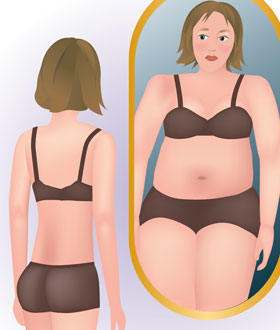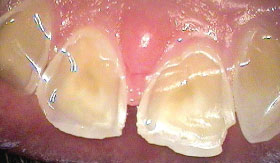Bulimia, Anorexia & Oral Health
How Dentists Spot Signs Of Eating Disorders
Dear Doctor,
Our dentist said that my daughter's teeth are showing signs of erosion. He asked me if she is overly concerned about her weight and appearance. Is there a connection?

Dear Jennifer,
There indeed could be a connection. Exploring it may uncover some uncomfortable issues but it is important to do so in order to make sure your daughter is healthy. Your dentist asked you about her body image because dental (tooth) erosion can be a sign of bulimia nervosa (“bou” – ox-like; “limos” – hunger), an eating disorder characterized by food binges followed by self-induced vomiting.
Dental erosion is characterized by the loss of tooth surface enamel (and later of exposed dentin, which forms the body of a tooth), by exposure to acid. Dental erosion affects more than 90% of people with bulimia nervosa and 20% of individuals with anorexia nervosa (“an” – without; “orexia” – appetite, desire), a different eating disorder characterized by self-starvation. There is considerable overlap between anorexia and bulimia; people with anorexia may sometimes engage in binge-purge behavior, and those with bulimia may have periods of severe food restriction.
Tooth erosion can be caused by exposure to other acidic foods and beverages. In fact sodas, sports drinks and juices, with their high levels of acidity, are the number one cause. When erosion is the result of an eating disorder, however, certain patterns will likely be observed and picked up by a dentist in particular.
Eating Disorders And Your Teeth
In bulimia, tooth erosion is caused by acid regurgitated from the stomach, which is brought up into the mouth during vomiting; it is extremely acidic and damaging. The frequency with which a person engages in binge-purge behavior will determine how seriously the teeth are affected. Usually erosion from bulimia is noticeable on the upper front teeth, particularly on the tongue side and incisal (biting) edges. The bottom teeth tend to be protected by the tongue when a person vomits, so this particular pattern of erosion is a cause for concern.
 |
| Teeth exposed to stomach acids lose enamel and their appearance becomes diagnostic for an eating disorder. |
| Photo provided by Dr. Martin S. Spiller |
Erosion is not the only sign a dentist or hygienist may notice that suggests an eating disorder. In severe cases the salivary glands can become enlarged, causing the sides of the face under the ears to look puffy. The palate, throat, and back of the tongue can appear reddened or otherwise traumatized from the use of fingers or other objects to induce gagging. Moreover, the acidity of the stomach contents can damage and cause ulceration of the soft tissues.
Anorexics may have various dental problems because they are often negligent about grooming and hygiene in general, which includes not taking care of their teeth and gums. In contrast, individuals with bulimia are by the nature of the disorder very aware of their body image and may practice excellent oral hygiene and grooming habits. In fact, aggressive oral cleaning with a toothbrush, especially right after throwing up, can increase a bulimic individual's loss of tooth enamel. Bulimics may also be able to keep up a more normal appearance and weight, making their disorder harder to uncover.
What You Can Do
First of all, have a frank conversation with your dentist, as he is the one who brought up the issue. Find out exactly what he noticed and the extent of the erosion problem. Ask what you can do about it in the short term. For example, it is important not to brush the teeth immediately after vomiting as this can increase the erosion. It is better to rinse with water — and even better with a little baking soda (neutralizes the acid) added to the water — and then let the saliva, nature's own neutralizing agent, do its work. He may suggest a sodium fluoride mouth rinse to strengthen the tooth enamel and reduce its loss. Ask him if he's noticed any other oral troubling signs. Your family doctor should also be consulted.
Go to the website of the National Eating Disorders Association. They have a wealth of information geared specifically toward parents, along with a toll-free helpline for information and referrals.
Monitor your daughter's behavior and if you think that she may have an eating disorder, don't hesitate to seek professional help. The sooner she is treated, the better chance she will have of making a full return to good health.




